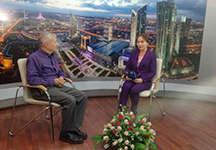
Eric Freedman interview on student TV station at East Kazakhstan State University
Knight Center director Eric Freedman spoke recently at an anti-corruption forum held at East Kazakhstan State University. The forum coincided with his two-week stint as a guest lecturer to journalism and language students at the university in Oskemen, Kazakhstan.
Freedman and MSU Journalism School alum Jim Mitzelfeld won a 1994 Pulitzer Prize for their coverage of a corruption scandal in the Michigan Legislature as reporters in the Detroit News Lansing Bureau.
Here are Freedman’s remarks at the forum:
No society is free of corruption, and that is unfortunately true of the United States as well. Speaking as a journalist, a professor and a citizen, I worry about 3 major types of corruption in our society.
The first is within government, from the local level to the highest offices in America. We read too often of city, county and state officials charged with crimes. Some are motivated by greed and money, while others are motivated by power. In my state, Michigan, a member of the legislature is awaiting trial on federal charges of soliciting a bribe from a labor union. The former mayor of Detroit is in prison for corruption. In Washington, one member of Congress recently resigned and pleaded guilty to financial crimes, while another member of Congress continues to serve while awaiting trial for using campaign funds for personal purposes, including luxury vacations and sexual affairs. And we see the president appointing large campaign donors to ambassadorships and top administration positions and naming industry insiders to regulate their own industries.
The second type of corruption I worry is among big businesses that are allowed to violate environmental, labor and public health laws. These have included mining companies, oil and gas companies and factories. It is no coincidence that many of these companies make large political contributions, and some hire former politicians to become their corporate executives and lobbyists. The fact that our current national government is relaxing environmental and health regulations makes it even easier for corporate criminals to avoid punishment.
The third type I see is even more troubling, again from my perspective as a journalist, a professor and especially a citizen. It is the corruption of American values as reflected in a rise in hate speech, racist speech, anti-Muslim speech, anti-Semitic speech, anti-LGBT speech and anti-immigrant speech, sometimes accompanied by violence. To me, this corruption is a direct attack on the American ideal of a tolerant, welcoming and diverse society, of a country that should have the morality and resources to provide shelter and refuge to those who need it, and a country that should be proud of the diversity of its people.
I am proud of the job that American journalists are doing in uncovering, exposing and reporting about all three types of corruption. I’m proud that my own work helped lead to the punishment of dishonest public officials. Without a vigorous, vigilant mass media, corruption would be much worse.
However, the work of the press will not be enough to reduce corruption. It also will take citizen activism and the efforts of civic and good government groups and courageous investigators and prosecutors to fight and prevent corruption.
